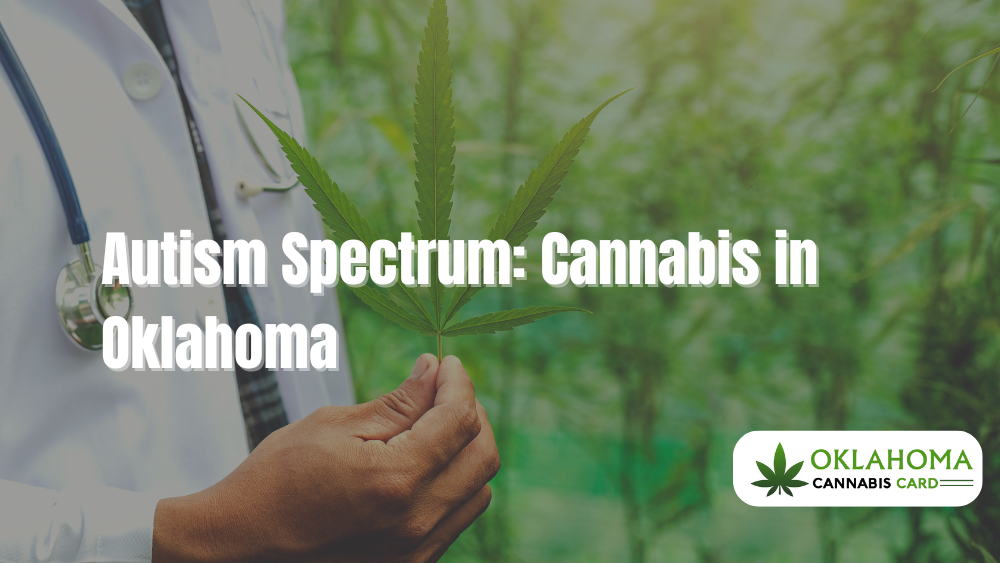 Living with a brain injury can be an overwhelming and challenging experience. For many Oklahoma residents dealing with the effects of traumatic brain injury (TBI), finding effective treatment options is crucial. In recent years, medical marijuana has emerged as a potential aid for managing various symptoms associated with brain injuries. This article will explore how individuals with brain injuries in Oklahoma can obtain a medical marijuana card and potentially benefit from cannabis as part of their treatment plan.
Living with a brain injury can be an overwhelming and challenging experience. For many Oklahoma residents dealing with the effects of traumatic brain injury (TBI), finding effective treatment options is crucial. In recent years, medical marijuana has emerged as a potential aid for managing various symptoms associated with brain injuries. This article will explore how individuals with brain injuries in Oklahoma can obtain a medical marijuana card and potentially benefit from cannabis as part of their treatment plan.
Table OF Content
- 1 Understanding Brain Injuries and Medical Marijuana
- 2 How Medical Marijuana May Help Brain Injury Patients
- 3 Qualifying for a Medical Marijuana Card in Oklahoma
- 4 Steps to Obtain Your Medical Marijuana Card
- 5 Using Medical Marijuana for Brain Injury: Best Practices
- 6 Legal Considerations in Oklahoma
- 7 Conclusion
- 8 Frequently Asked Questions
- 8.1 Is medical marijuana safe for brain injury patients?
- 8.2 Can I use my Oklahoma medical marijuana card in other states?
- 8.3 Will using medical marijuana affect my ability to work or drive?
- 8.4 How long does it take to feel the effects of medical marijuana?
- 8.5 Can I stop taking my other medications if I start using medical marijuana?
Understanding Brain Injuries and Medical Marijuana
Brain injuries can result from various causes, including accidents, falls, or strokes. The effects of a TBI can be wide-ranging, impacting cognitive function, emotional regulation, and physical abilities. Some common symptoms that individuals with brain injuries may experience include:
- Chronic pain
- Headaches
- Seizures
- Sleep disorders
- Anxiety and depression
- Memory issues
- Mood swings
Medical marijuana has shown promise in addressing several of these symptoms. The cannabinoids in marijuana, particularly CBD and THC, have anti-inflammatory, analgesic, and neuroprotective properties that may benefit those with brain injuries.
How Medical Marijuana May Help Brain Injury Patients
Research into the effects of medical marijuana on brain injuries is ongoing, but early studies and anecdotal evidence suggest several potential benefits:
- Pain Management: Cannabis can help alleviate chronic pain, which is common in TBI patients.
- Neuroprotection: Some studies indicate that cannabinoids may help protect brain cells and promote healing.
- Seizure Control: Particularly CBD-rich strains have shown effectiveness in reducing seizure frequency.
- Mood Regulation: Medical marijuana may help manage anxiety, depression, and mood swings associated with TBI.
- Sleep Improvement: Many patients report better sleep quality when using medical cannabis.
Qualifying for a Medical Marijuana Card in Oklahoma
Oklahoma has one of the most inclusive medical marijuana programs in the United States. Unlike many states, Oklahoma does not have a specific list of qualifying conditions. Instead, it’s up to the discretion of licensed physicians to recommend medical marijuana if they believe it could benefit the patient.
For individuals with brain injuries, this means that if a qualified doctor determines that medical marijuana could help manage your symptoms, you may be eligible for a medical marijuana card.
Steps to Obtain Your Medical Marijuana Card
- Consult with a Qualified Physician: Schedule an appointment with a doctor registered with the Oklahoma Medical Marijuana Authority (OMMA). They will evaluate your condition and determine if medical marijuana is appropriate for you.
- Receive a Recommendation: If approved, your doctor will provide you with a recommendation for medical marijuana.
- Apply Online: Visit the OMMA website and complete the online application. You’ll need to provide personal information, your physician recommendation, and pay the application fee.
- Wait for Approval: OMMA typically processes applications within 14 business days.
- Receive Your Card: Once approved, you’ll receive your medical marijuana card in the mail.
At Oklahoma Cannabis Card, we simplify this process by connecting you with qualified physicians and assisting with your application. Our service provides an Oklahoma Medical Marijuana Card for $129, with renewals every two years for $99.
Using Medical Marijuana for Brain Injury: Best Practices
If you’re new to using medical marijuana for your brain injury, consider these tips:
- Start with low doses and gradually increase as needed.
- Consider CBD-dominant strains, which may offer benefits with less psychoactive effects.
- Keep a journal to track your symptoms and how different strains or methods of consumption affect you.
- Discuss your marijuana use with all your healthcare providers to ensure it doesn’t interfere with other treatments.
- Be aware of potential side effects, which can include dizziness, dry mouth, and changes in appetite.
Legal Considerations in Oklahoma
While medical marijuana is legal in Oklahoma, it’s important to understand the laws surrounding its use:
- You must be 18 or older to apply for a medical marijuana card (minors require a caregiver).
- Cardholders can possess up to 3 ounces of marijuana on their person and 8 ounces at home.
- Growing your own plants is allowed (up to 6 mature plants and 6 seedlings).
- Driving under the influence of marijuana is illegal and can result in a DUI.
Conclusion
For individuals living with brain injuries in Oklahoma, medical marijuana may offer a new avenue for symptom management and improved quality of life. While it’s not a cure-all, many patients have found relief through cannabis use. If you’re considering medical marijuana as part of your treatment plan, consult with a qualified physician and stay informed about the latest research and best practices.
Remember, everyone’s experience with medical marijuana is unique. What works for one person may not work for another, so patience and careful monitoring are key as you explore this treatment option.
Frequently Asked Questions
Is medical marijuana safe for brain injury patients?
While research is ongoing, many brain injury patients have reported benefits from medical marijuana use. However, it’s crucial to consult with a healthcare provider to ensure it’s appropriate for your specific situation.
Can I use my Oklahoma medical marijuana card in other states?
Some states offer reciprocity for out-of-state medical marijuana cards, but laws vary. Always check local regulations before traveling with or using medical marijuana in another state.
Will using medical marijuana affect my ability to work or drive?
It’s illegal to drive under the influence of marijuana. Regarding employment, Oklahoma has laws protecting medical marijuana patients from discrimination, but there are exceptions for safety-sensitive jobs.
How long does it take to feel the effects of medical marijuana?
The onset of effects varies depending on the method of consumption. Inhalation methods typically work within minutes, while edibles can take 1-2 hours to take effect.
Can I stop taking my other medications if I start using medical marijuana?
Never stop or change your medication regimen without consulting your healthcare provider. Medical marijuana should be viewed as a complementary treatment, not a replacement for other prescribed medications.





